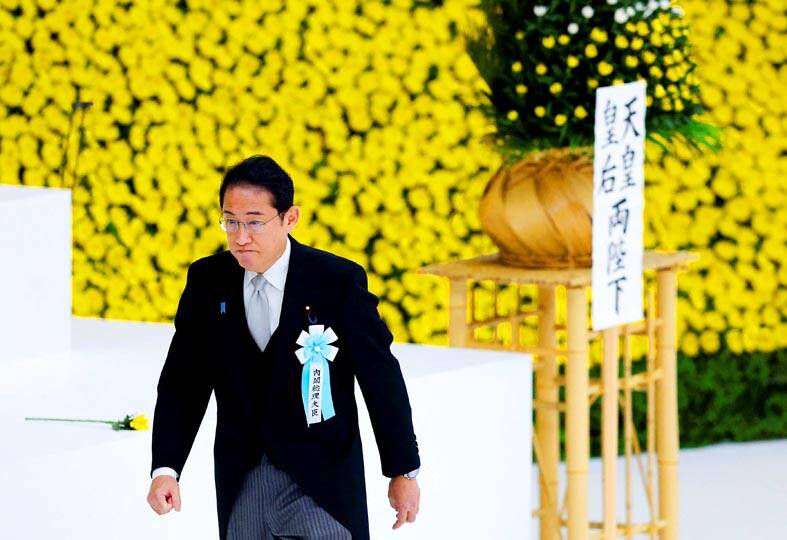The US, Japan and South Korea are to launch a series of joint initiatives on technology and defense when the nations’ leaders gather at Camp David on Friday, according to senior US administration officials, amid mounting shared concerns about China.
While the summit is unlikely to produce a formal security arrangement that commits the nations to each others’ defense, they would agree to mutual understanding about regional responsibilities and set up a three-way hotline to communicate in times of crisis, the officials said, speaking on condition of anonymity.
US President Joe Biden invited Japanese Prime Minister Fumio Kishida and South Korean President Yoon Suk-yeol to the storied presidential retreat in Maryland’s Catoctin Mountains as the Asian nations work to mend their tattered diplomatic relations in the face of greater regional threats posed by China’s rise and North Korea.

Photo: Reuters
It would mark the first in what US officials hope to be an annual gathering between the three nations’ leaders.
South Korea and Japan held their first joint summit in 12 years in March and have made steps to ease tensions after years of disputes, including some related to Japan’s 1910 to 1945 occupation of Korea.
Washington has formal collective defense arrangements in place with Tokyo and Seoul separately, but it wants the two nations to work closer together given growing concerns about China’s mounting power.
“We are anticipating some steps that will bring us closer together in the security realm,” said one of the US officials, adding that doing so would “add to our collective security.”
However, the official said that “it’s too much to ask — it’s a bridge too far — to fully expect a three-way security framework among each of us. However, we are taking steps whereby each of the countries understand responsibilities with respect to regional security, and we are advancing new areas of coordination and ballistic missile defense, again technology, that will be perceived as very substantial.”
The summit is also expected to lead to a joint statement between the nations that includes some language speaking to concerns about China’s desire to change the status of Taiwan.
The US, Japanese and South Korean joint statement is set to include language on maintaining peace and stability in the Taiwan Strait, one of the officials said.
The exact language on that and other provisions are expected to be negotiated up to the last minute, but the language currently under consideration would be consistent with prior US positions on the subject, avoiding a sharp escalation in rhetoric with Beijing as Washington has been seeking to ease tensions.

INVESTIGATION: The case is the latest instance of a DPP figure being implicated in an espionage network accused of allegedly leaking information to Chinese intelligence Democratic Progressive Party (DPP) member Ho Jen-chieh (何仁傑) was detained and held incommunicado yesterday on suspicion of spying for China during his tenure as assistant to then-minister of foreign affairs Joseph Wu (吳釗燮). The Taipei District Prosecutors’ Office said Ho was implicated during its investigation into alleged spying activities by former Presidential Office consultant Wu Shang-yu (吳尚雨). Prosecutors said there is reason to believe Ho breached the National Security Act (國家安全法) by leaking classified Ministry of Foreign Affairs information to Chinese intelligence. Following interrogation, prosecutors petitioned the Taipei District Court to detain Ho, citing concerns over potential collusion or tampering of evidence. The

NEGOTIATIONS: Taiwan has good relations with Washington and the outlook for the negotiations looks promising, Minister of Economic Affairs J.W. Kuo said Taiwan’s GDP growth this year is expected to decrease by 0.43 to 1.61 percentage points due to the effects of US tariffs, National Development Council (NDC) Minister Paul Liu (劉鏡清) said at a meeting of the legislature’s Economics Committee in Taipei yesterday, citing a preliminary estimate by a private research institution. Taiwan’s economy would be significantly affected by the 32 percent “reciprocal” tariffs slapped by the US, which took effect yesterday, Liu said, adding that GDP growth could fall below 3 percent and potentially even dip below 2 percent to 1.53 percent this year. The council has commissioned another institution

NEGOTIATIONS: The US response to the countermeasures and plans Taiwan presented has been positive, including boosting procurement and investment, the president said Taiwan is included in the first group for trade negotiations with the US, President William Lai (賴清德) said yesterday, as he seeks to shield Taiwanese exporters from a 32 percent tariff. In Washington, US Trade Representative Jamieson Greer said in an interview on Fox News on Thursday that he would speak to his Taiwanese and Israeli counterparts yesterday about tariffs after holding a long discussion with the Vietnamese earlier. US President Donald Trump on Wednesday postponed punishing levies on multiple trade partners, including Taiwan, for three months after trillions of US dollars were wiped off global markets. He has maintained a 10 percent

TRADE: The premier pledged safeguards on ‘Made in Taiwan’ labeling, anti-dumping measures and stricter export controls to strengthen its position in trade talks Products labeled “made in Taiwan” must be genuinely made in Taiwan, Premier Cho Jung-tai (卓榮泰) said yesterday, vowing to enforce strict safeguards against “origin laundering” and initiate anti-dumping investigations to prevent China dumping its products in Taiwan. Cho made the remarks in a discussion session with representatives from industries in Kaohsiung. In response to the US government’s recent announcement of “reciprocal” tariffs on its trading partners, President William Lai (賴清德) and Cho last week began a series of consultations with industry leaders nationwide to gather feedback and address concerns. Taiwanese and US officials held a videoconference on Friday evening to discuss the